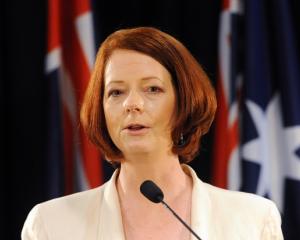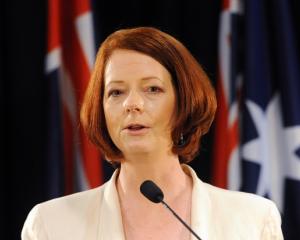Australian voters have had a rapid lesson in coalition forming these past two weeks, after having sent a message to all political parties of their dissatisfaction.
New Zealand, which is now relatively used to the concept and the experience, could provide their nearest neighbours with a good deal more advice about what to expect in the coming months and years, if the coalition lasts that long.
There is some doubt that it will, although the two independent MPs whose support enabled Labor's Julia Gillard to form a government, evidently believe she, rather than Opposition leader Tony Abbott, is more likely to sustain a Parliament for its full term.
Deal-making is the name of the coalition game, and by Tuesday night, the deals extracted by the three Independents and one Green MP who held the king-making role, had been worked out.
Governments born out of coalition are usually only as strong as their weakest link and the new Gillard coalition has the appearance of much weakness.
Labor won less than 38% of the primary vote and less than 50% of the two-party preferred terms, let alone a majority of seats.
The decision by one of the Independents, the rural MP Rob Oakeshott, to join in coalition with Labor may well have been a seat-saving one since Mr Abbott is thought to have preferred to seek a new electoral mandate within months believing it would strengthen a government he led, and would have offered risk.
The Independents' support also had a price-tag: $NZ12.6 billion dedicated to regional services, infrastructure and economic development in an attempt to "recalibrate" the long history of the imbalance between federal government spending between town and country.
The issue of broadband services alone was a key factor in the campaign, being considered by country people with poor connections as their being disadvantaged merely by location.
But so, too, are several other policies: the Independents want an emissions trading scheme, including a price on carbon emissions which Labor notionally supports; renewable-energy programmes that will benefit regional Australia; improvements to regional education, and a national tax summit.
Undoubtedly, an important factor in the outcome, and one with many echoes in this country, was general unhappiness with politicians of all persuasions.
The level of contempt for MPs has been gradually building in Australia, and more rapidly in the past two or three years with a succession of personal and political scandals involving individuals in both federal and state governments, and numerous "broken promises".
"A plague on all your houses" has been cited by some commentators as a significant factor in voting behaviour.
As in this country in recent times, the Australian election campaign was itself fought almost entirely in presidential style.
It seemed at times there were only two contestants, Ms Gillard and Mr Abbott, and the policy debate reached levels of competitive farce at times, while being generally negative in tone.
It is clear all sides lost the faith and trust of electors and one of Ms Gillard's first tasks is to try to restore confidence in government.
As one Australian columnist wrote this week: "The more politicians have relied on the techniques of market research - polling, focus groups, advertising and direct mail - the more they've sought to con us."
The new Government will likely mean little change in the working relations between Australia and New Zealand and, as our Prime Minister has indicated, the usual bilateral meetings are likely to continue as scheduled next February.
Ms Gillard and her Cabinet must now attempt to govern in coalition with a minority administration with no substantial electoral legitimacy and a very limited hold on power.
She may find it just as difficult a task as did National in 1996 and Labour in 1999 here - with the significant difference that Australia does not yet have proportional representation.
She is new to the job, both as Prime Minister and leader of her party, but then, so is Mr Abbott, who took the Liberal leadership from Malcolm Turnbull less than a year ago, and by a single vote.
Ms Gillard must sustain the needs of the Independents - who have all the leverage and intend to make use of it - while massaging her own support within her caucus and the broader party.
It is a task that would challenge the most able politician - and will endure only for so long as she survives parliamentary votes of no-confidence. They may not be long in coming.






